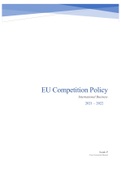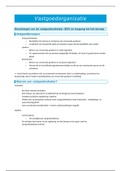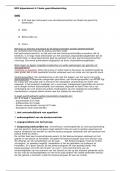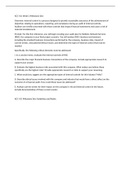International Business
2021 – 2022
Sarah P
Vrije Universiteit Brussel
, 1st Master International Business
The basic idea of competition policy as for consumer welfare competition is good in the market, so
we need to make sure that competition is preserved because competition typically brings out the
best in trying to outcome the other furnace it getting a better products on the market. Trying to sell it
at a cheaper price because otherwise your clients are going to your competitor where they have
more choice. Offering good service to keep your clients as a competition usually is our perspective of
welfare.
Dumping is a quite general term if you think of dumping in terms of international trade and selling
below cost in another country than it is in their trade policy area. When you look at dumping at
either excessive price, or predatory pricing which also sometimes involves selling below cost, then
we enter into the territory of competition policy. Predatory pricing can be an example of abuse of
dominants.
If companies that don’t want to compete, they can make an agreement that each one sells in their
own country. You promise to each other that you stay out of each other’s market, rather than
competing in each country.
The elements of competition policy
1. Antitrust: preventing anticompetitive practices and abuse of dominance.
2. Merger control: preventing anticompetitive concentrations.
3. State aid: limiting distortions to competition and trade resulting from state interventions.
1. Antitrust
Anticompetitive practices
• Horizontal agreements such as:
Price agreement
Output restriction
Market allocation
Bid rigging
• Vertical agreements such as:
Exclusive supply agreement
Tie-in
Resale price maintenance
• Hub and Spoke
Horizontal anticompetitive practice through coordination via hub
• Abuse of dominance via
o Exploitative practices
Excessive pricing
Discrimination
o Exclusionary practices
Predatory pricing
Refusal to deal
Page | 1
, 1st Master International Business
2. Merger Control
Anticompetitive concentrations
• Horizontal mergers involving competitors
• Vertical mergers involving companies in the vertical supply chain
• Conglomerate mergers involving firms in different lines of business
• Other types of concentration such as:
Acquisition
Full function joint venture
,…
3. State Aid
Distorting State Intervention
Defining State aid:
• Advantage • Distorting competition
• Selective • Affecting trade
• State resources
In principle forbidden, but there are exceptions: EU context only, although notion starts to surface in
other jurisdictions.
Sometimes other elements of competition policy could also include:
Liberalizing markets
Market regulation
Public procurement rules
,…
Who enforces competition policy?
Competition Authorities
National Competition Authorities (NCAs) such as:
Competition & Markets Authority Korea Fair Trade Commission
Belgian Competition Authority ,…
Bureau of Competition (US)
Supranational Competition Authority:
DG Competition (EU)
History – milestones
1957 Treaty of Rome 1990 Merger Regulation
1962 Regulation N°17 2003 New Antitrust Regulation
o Commission’s power to o End of centralized notification
investigate 2004 New Merger Regulation
o Obligatory notification of o New SIEC test
agreements
Page | 2
, 1st Master International Business
For companies.. know the rules or endure the consequences
The consequences depend on the jurisdiction and can be:
• Company fine • Damage claims
• Personal fine • Agreements are void
• Imprinsonment • Delay
• Loss of reputation • Recovery of aid
• ,…
The next capitalist revolution
Capitalism has suffered some blows to its reputation.
A revolution is needed. Why? :
Market concentration has risen in most industries
Profits are relatively high compared to the past
It is more difficult to force dominant firms out of position
Although globalization heats competition for many, not all industries are subject to these pressures.
Some rents are quite hidden
• Two-sided markets (google, Facebook,..)
Other rents are very clear
• Airline industry and restructuring
• TV firms
Solution: antitrust laws must be made fit for the 21st century
Result:
• Profits return to ‘normal’ levels
• Wages increase
• Choice increases
• Productivity rises
• Restore the public’s faith in capitalism
➔ ≠ populist discourse regarding capitalism
An age of Giants
Without sufficient competition, prices are too high and productivity remains too low.
“Without competition, capitalism is torpid and favors the few, not the many”
Several markets where above normal profits are maintained for years ➔ Competition has faded and a
response is needed!
The Big Picture
Free cash flows and profits have risen
steadily over the past decades
Where are they mostly?
Page | 3












